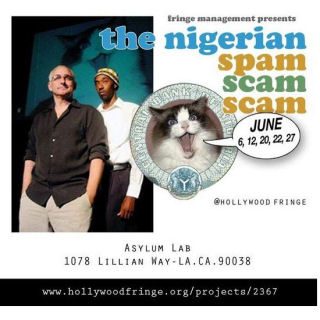 The ACSAC conference is over. I come home after a week commuting back and forth to the hotel, and what do I find? I left the news chum simmering on the stove. Let’s hope it didn’t get burnt or go bad…
The ACSAC conference is over. I come home after a week commuting back and forth to the hotel, and what do I find? I left the news chum simmering on the stove. Let’s hope it didn’t get burnt or go bad…
- Brushes with Fame. Here’s an interesting article on Aaron Wolf, who has just premiered a documentary on the rebuilding of Wilshire Blvd Temple, and how that helped him find a reconnection to Judaism. I knew Aaron’s grandfather well, and we happened to essentially have dinner with Aaron and his family before the Stan Freberg earlier this year (they sat next to us, and we struck up a conversation when we realized we had friends in common, such as Aaron’s family).
- An IRS Scam. In my last post, I wrote about Nigerian scammers. Be forewarned: there is a real scam out there now where you get a call from someone pretending to be the IRS, and that there is legal action against you. Even people knowledgeable about computer scams can fall for it.
- Travel in Segregated Times. Here’s an interesting article about the travel guide that black travelers needed to use in the era of segregation. The Green Book, which was published from 1936 to 1966, was probably the only travel guide in American history that looked forward to its own obsolescence. It was designed explicitly to help African-American travelers find hotels, restaurants, and gas stations that would accommodate them during the era of segregation, and it was often optimistic about the day that no American taking a road trip would need to consult a special, separate book to let him know where it would be safe to stop for the night.
- Starting a Podcast. Here’s a neat article on Alex Blumberg, who went from This American Life to start his own successful podcast company. Since its official launch in 2014, Gimlet has grown from a single podcast to a handful (five, to be exact, including the internet-focused “Reply All” and “Mystery Show,” which solves everyday mysteries), and from a handful of employees to about 30.
- Going Away. Here are two articles about things going away or losing support. In the first, the last C-17 has come off the line in Long Beach, signalling the end of aircraft manufacturing not only in Los Angeles, not only in Southern California, but in all of California. California was once the center of manufacturing for both Douglas and Lockheed. The second is about Mozilla wanting to drop support for Firefox development; in fact, it now looks like they are letting it go on its own. That’s too bad: Thunderbird was a good email client; Outlook is not the same.
- Medical News. Two medical items of interest. In the first, they have identified a protein in the gut that may explain gluten sensitivity. A study from Giovanni Barbara and his team at the University of Bologna, Italy, suggests that gluten-sensitive individuals may harbor high levels of a molecule called zonulin that is linked to inflammation. In the study, levels in gluten-sensitive individuals almost matched those of celiacs. In the second, there may be a connection between asthma and migraines: in fact, they may make them chronic. Researchers at the University of Cincinnati and Montefiore Headache Center explored the link between migraines and asthma because they are similarly caused by inflammation, either of the blood vessels or airways. They theorize that if one is not directly caused by the other, they may be caused by the same allergens, suggesting allergies in some patients be treated more aggressively.
- A New Nethack. Yes, there is a new version of Nethack out.
- There’s a Reason. Have you ever wondered why streets have odd patterns. It turns out there is a story in the ghosts of streets that existed in the past.
- Effects of Monocultures. Monocultures bad. Diversity good. No matter what Donald Trump things. No where is this truer than in the world of bananas.



 As I wrote in
As I wrote in